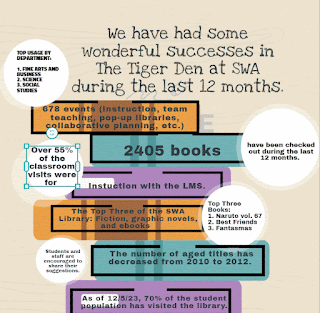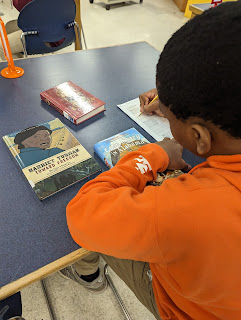- Building a Reading Culture
- Black History Month resources
- Choice Board: Winter Edition
- Resources for ALL
- Special Edition: Student Testimonials
tlovesbooks
Hello. The main purpose of this blog is to share some of my adventures inside and outside of the library's walls.
Thursday, January 16, 2025
Sunday, October 20, 2024
THE Answer (2024)
Years ago, I was preparing to leave for the ISTE conference when I read an article in The New York Times about staffing cuts in public libraries. The article also discussed budget cuts in the school libraries around the U.S. Due to budget cuts, some school systems in Oregon and Illinois chose to cut library programs as an answer to saving money. The answer (I thought) was ridiculous. The article angered me so much that I had to write. This poem titled, THE Answer, was created.
Below is a revised version of the poem shared on this blog in October 2011. Still a work in progress; please link to this blog if you share.
Last Year's Successes Lead to This Year's Opportunities
This school year has been a bear. Many of the other educators I have spoken to feel the same; however, our dedication to our students and the work that we do pushed us along.
I mention this because the above video highlights some of the reasons for my passion as a school librarian. From working with students in the library to collaborating with teachers in the classrooms, my job extends beyond the walls of our school library.
Today, I wanted to share a video that was only shared with members of our school community. I hope it will showcase the gains of our school library program and serve as a form of motivation for me to focus on the wins and possibilities of the school library program at Southwest Academy.
Saturday, December 16, 2023
MD fREADom Fighters
The Maryland fREADom Fighters newsletter is a resource for all who support literacy and libraries.
Use the link in the image to learn more.
Wednesday, December 6, 2023
Wednesday, November 15, 2023
Tuesday, May 30, 2023
Thank you, MASL.
Below is a copy of my final message as President of MASL.
May 25, 2023
For my final message, I would like to share some information that led to this opportunity to serve as President of MASL. My hope is that this will inspire anyone interested in working with the Executive Board or other committees within MASL.
A few years ago, I was asked to think about running for President. During those two years, I worked within the organization to provide resources requested by members and create resources to handle what the Executive Board saw as challenges for our organization. From the I Love My School Library Award to Operation Proclamation, we were able to promote the work of school librarians in the state of Maryland and highlight our value within our school communities.
Working with the Advocacy Committee, we were able to create a toolkit for Proadvocacy, as well as take part in discussions within our state and outside to promote the role of the library advocate. Each task was completed with the desire to promote the expressed goals, mission, and vision of MASL. A tremendous responsibility, it took another year for me to consider the position and submit my name for the office of president.
My year as president of MASL is coming to an end. I know that together we have made a positive difference. That difference came in the form of working with committees to provide resources for MASL members, as well as advocating for DC school librarians and the upcoming Freedom to Read Bill that will be proposed later this year. From engagement with legislators at the MLA Legislative Day effort to letters of advocacy when requested and a presentation at the Maryland GLSEN conference, I have been glad to represent MASL in a variety of ways.
This year, we also met with the Maryland Association of Public Libraries to build a foundation for a possible partnership. MASL also strengthened our ties with various organizations, such as the Maryland Library Association (MLA) and the Citizens of Maryland Libraries (CML). Both organizations have been helpful in providing resources and information. I look forward to seeing these partnerships grow in the future.
All my experiences as a member and now outgoing president exemplify the desire for MASL to provide leadership opportunities for MASL members.
A sincere thank you to those who have been supportive of my role as president. Whether you contacted me via email or shared a thank you in person, you are appreciated. My thanks and appreciation cannot adequately be expressed in a written message. Please use the following link to access a montage of memories for the MASL members titled, Thanks to MASL.
https://www.smore.com/y9urc-p-a-c-e-in-action
I look forward to seeing the great things Donna Mignardi, our new president, will do to continue to move MASL forward. She and members of the board have been working on great ideas. From regional meetups to a proposed format for the MASL conference, the Executive Board has been working diligently to enhance the resources available to our members. Stay tuned.
In conclusion, as we
prepare for the summer, I encourage any MASL member who has not already done so
to join a committee and/or attend a committee meeting. Your input is valued and
needed.
Together, we are stronger.
Sincerely,
Tatanisha “Tiki” Love,
Ed.S.
Thursday, April 20, 2023
The Value of a School Librarian
"...those with unique skills, temperament, knowledge, and passion were hard to find."
Monday, March 27, 2023
Reset Time: Part Two
Recently, I spoke with a
teacher about young people and their reading habits. The teacher believed
that young people don't like to read. A common misperception, I quickly
shared that based on my experience most young people don't enjoy reading
because they don't have choice and access. I shared some of my
experiences with undiscovered readers and suggested he give Book Matching a try.
He agreed and we set up a time for the students to receive the survey and
selected days for the class visits to the library.
The class visits were a chance for me to meet the students and lead them through the surveys. During the visits, I shared the background of Book Matching and the connection to an upcoming
assignment. Most students were interested to hear book suggestions would be
made based on their interests. There were also a few students who were
nonplussed and uninterested. I assured them that they would enjoy the process.
The first set of surveys was completed.
Due to a glitch, the
second set of surveys was not completed. Based on the time necessary to review
surveys and select three to four titles for each student, Mr. Giles and I
revamped the focus of the class visit and morphed it into a thematic Book
Tasting.
A first for me, I pulled
a variety of nonfiction and fiction titles related to the theme and topic of
resistance. From graphic novels depicting the American Revolution to
historical fiction set in WWII, numerous genres and formats were selected. Each
place setting included three titles: a nonfiction title, a fiction title, and a
graphic novel, comic, or manga. The three books were placed on the tables in
the library as place settings.
The first day of classes
began with students discussing their ideas of
what a book tasting might be. Some students mentioned "trying out new
books" and others shared that they would have a chance to look at books to
see what they liked. I then shared the purpose of the Book Tasting. Mr. Giles
shared the why. Next, I discussed the process and modeled for the students ways to use a variety of pre-reading strategies to "taste" the books and the first round of Book Tasting began.
After two to three
rounds, students were able to check out books that they had listed as their top
picks. By the end of the day, 65 books had been checked out by the two
classes. I decided to revise the lesson one more time.
For the second day of
lessons, students didn't receive a worksheet. Instead, students were asked to
place their favorite books to the right, their least favorite books to the
left, and any other book in the middle. After the first round, students were able
to take their top picks with them as they "tasted" other titles. By the time
the class had completed three to four rounds, many students had at least one
book selected to check out. By the end of the day, we
had 36 students who had checked out 41 books.
Two things were
observable, the students enjoyed the visit and were excited to get books.
Second, nearly half of the students were visiting the library for the first
time in nearly two years. *
The enjoyment was
apparent the next day when two students stopped by the library to check out
more books.
Based on this
experience, this reset of Book Tasting will be shared with more classroom
teachers to connect curricular requirements and infuse the joy of
reading.
Stay tuned for more
updates.
* See my previous
blog, Reset Time: Part One, for
more details.
Sunday, March 12, 2023
Reset Time: Part One
Spring is a time to reset. In an effort to reset the library program at my school, I am providing information to highlight successes, as well as spotlight resources that are available to the school community. I will chronicle the promotions throughout the month of March.
First, an infographic. A quick and easy tool to showcase some of the positives, I created two infographics. The first version had the four highlights of the library program. When it was shared with a few others, the reception was lukewarm. This led to the creation of version two.
4 Highlights of the SWA Library Program
It's important to note that my current school did not have a librarian in the building for nearly two years. For some, the checkout numbers and visits may be low; however, my school community is relearning to utilize the library program for lessons and access to engaging literature. This reset time is a chance for us to focus on the positives.
Stay tuned for more updates to Project Reset.
Wednesday, February 15, 2023
Curation and Presentation Ideas for Black History Month
February is Black History Month. While the history of any group of people should not be relegated to one month, consider using one or more of the following resources to highlight the rich history and accomplishments of African Americans.
- Black Resistance provided by the Association for the Study of African American Life and History (ASALH)
- Black History Month Virtual Festival
- NMAAHC Kids - Black Characters Celebration: Celebrating Encanto's Antonio
Whether you use author visits, research, or book talks, there are so many ways to provide resources and highlight the wonderful history of African Americans with your school community.
Tuesday, May 17, 2022
Recognizing AAPI Month
Are you looking for ways to recognize AAPI Month in your library?
The Very Asian Foundation along with We Need Diverse Books (WNDB) and The Asian/Pacific Librarians Association of the ALA (APALA) recently created a project called The May Book Project.
Created as a way to provide information that can be used to promote Asian American Pacific Islander Heritage Month, the May Book Project has a variety of resources.
In a poignant video, students express the importance of seeing themselves in a book and detail the steps taken to complete The May Book Project.
"We are raising national awareness of the need to create inclusive libraries, give readers access to up-to-date Asian American literature, and provide funding for donating books to libraries." -- Very Asian Foundation
























